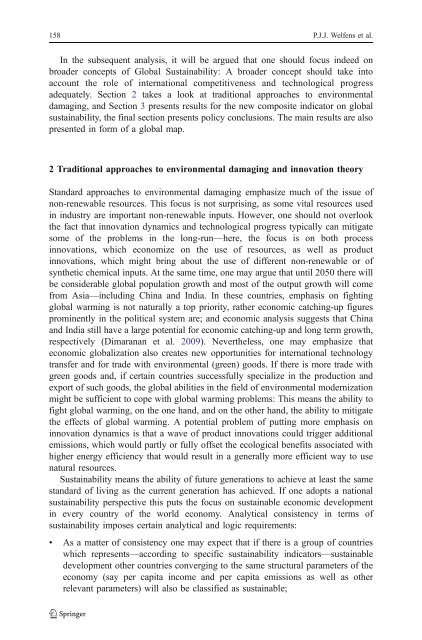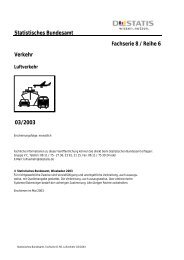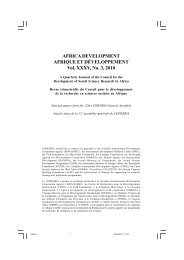The international economics of resources and resource ... - Index of
The international economics of resources and resource ... - Index of
The international economics of resources and resource ... - Index of
Create successful ePaper yourself
Turn your PDF publications into a flip-book with our unique Google optimized e-Paper software.
158 P.J.J. Welfens et al.<br />
In the subsequent analysis, it will be argued that one should focus indeed on<br />
broader concepts <strong>of</strong> Global Sustainability: A broader concept should take into<br />
account the role <strong>of</strong> <strong>international</strong> competitiveness <strong>and</strong> technological progress<br />
adequately. Section 2 takes a look at traditional approaches to environmental<br />
damaging, <strong>and</strong> Section 3 presents results for the new composite indicator on global<br />
sustainability, the final section presents policy conclusions. <strong>The</strong> main results are also<br />
presented in form <strong>of</strong> a global map.<br />
2 Traditional approaches to environmental damaging <strong>and</strong> innovation theory<br />
St<strong>and</strong>ard approaches to environmental damaging emphasize much <strong>of</strong> the issue <strong>of</strong><br />
non-renewable <strong><strong>resource</strong>s</strong>. This focus is not surprising, as some vital <strong><strong>resource</strong>s</strong> used<br />
in industry are important non-renewable inputs. However, one should not overlook<br />
the fact that innovation dynamics <strong>and</strong> technological progress typically can mitigate<br />
some <strong>of</strong> the problems in the long-run—here, the focus is on both process<br />
innovations, which economize on the use <strong>of</strong> <strong><strong>resource</strong>s</strong>, as well as product<br />
innovations, which might bring about the use <strong>of</strong> different non-renewable or <strong>of</strong><br />
synthetic chemical inputs. At the same time, one may argue that until 2050 there will<br />
be considerable global population growth <strong>and</strong> most <strong>of</strong> the output growth will come<br />
from Asia—including China <strong>and</strong> India. In these countries, emphasis on fighting<br />
global warming is not naturally a top priority, rather economic catching-up figures<br />
prominently in the political system are; <strong>and</strong> economic analysis suggests that China<br />
<strong>and</strong> India still have a large potential for economic catching-up <strong>and</strong> long term growth,<br />
respectively (Dimaranan et al. 2009). Nevertheless, one may emphasize that<br />
economic globalization also creates new opportunities for <strong>international</strong> technology<br />
transfer <strong>and</strong> for trade with environmental (green) goods. If there is more trade with<br />
green goods <strong>and</strong>, if certain countries successfully specialize in the production <strong>and</strong><br />
export <strong>of</strong> such goods, the global abilities in the field <strong>of</strong> environmental modernization<br />
might be sufficient to cope with global warming problems: This means the ability to<br />
fight global warming, on the one h<strong>and</strong>, <strong>and</strong> on the other h<strong>and</strong>, the ability to mitigate<br />
the effects <strong>of</strong> global warming. A potential problem <strong>of</strong> putting more emphasis on<br />
innovation dynamics is that a wave <strong>of</strong> product innovations could trigger additional<br />
emissions, which would partly or fully <strong>of</strong>fset the ecological benefits associated with<br />
higher energy efficiency that would result in a generally more efficient way to use<br />
natural <strong><strong>resource</strong>s</strong>.<br />
Sustainability means the ability <strong>of</strong> future generations to achieve at least the same<br />
st<strong>and</strong>ard <strong>of</strong> living as the current generation has achieved. If one adopts a national<br />
sustainability perspective this puts the focus on sustainable economic development<br />
in every country <strong>of</strong> the world economy. Analytical consistency in terms <strong>of</strong><br />
sustainability imposes certain analytical <strong>and</strong> logic requirements:<br />
& As a matter <strong>of</strong> consistency one may expect that if there is a group <strong>of</strong> countries<br />
which represents—according to specific sustainability indicators—sustainable<br />
development other countries converging to the same structural parameters <strong>of</strong> the<br />
economy (say per capita income <strong>and</strong> per capita emissions as well as other<br />
relevant parameters) will also be classified as sustainable;








